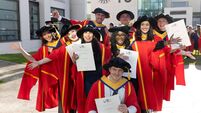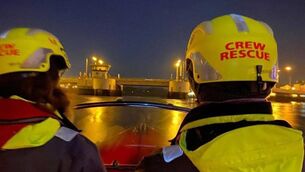Fr Liam Power: Pope Francis - a tribute to a great moral and spiritual leader

'I would like to pay a personal tribute to one of the great world leaders of the 21st century.'
Like millions of people throughout the world, I was deeply saddened by the news of the death of Pope Francis on Easter Monday. It was consoling to realise that his passing was mourned by the whole of humanity. It was as if the world had lost not just an inspirational leader but a friend, someone whose heart was open to the whole world, to quote from his wonderful encyclical, Fratelli Tutti.
While glowing tributes have been paid to Francis in the intervening period, the focus is now on the Conclave of Cardinals assembling to appoint his successor.
However, as Francis was such an inspirational figure for me, I would like to pay a personal tribute to one of the great world leaders of the 21st century.
The primary image of the Church for the late Pope was that of a field hospital. He wanted a Church that was outward-looking, responsive to the needs of the world. He called for a Church that responds in mercy to the deepest wounds of humanity, meeting people where they are at. Francis said in one of his off-the-cuff interviews that: “It is useless to ask a seriously injured person if he has high cholesterol and about the level of his blood sugars! You have to heal his wounds,” he said. “Then we can talk about everything else.”
He applied this pastoral image of the Church consistently in all his teaching documents.
His primary emphasis was always that of mercy. Mercy, according to Francis, is the very foundation of the Church’s life. All of her pastoral activity should be caught up in the tenderness she makes present to people; nothing in her preaching and in her witness to the world should be lacking in mercy.
He always insisted that it was not enough for Church leaders to insist on laying down laws or principles of Catholic teaching.
Christian leaders must always take account of the real-life situations of those with whom they are dealing and always keep in mind the fundamental, that is, the Christian belief in the compassion and mercy of God.
The priority given to mercy is the most distinctive feature of the document on the Joy of Love, which was issued after the Synod on the Family in 2014 and 2015.
Francis said that he does not want pastors to apply the moral laws to those living in irregular situations (such as couples in second marriages for example) “as if they were stones to throw at people's lives.”
His insistence on the priority of mercy led Francis to suggest that divorced people who have married again could, in certain circumstances, be allowed to receive Holy Communion. He reminded us that the Eucharist is not a prize for the perfect but a powerful medicine and nourishment for the weak.
In this respect, Francis was very challenging to us clergy. He called us to let our lives become “wonderfully complicated by recognising God’s grace at work in difficult and sometimes unconventional situations families and marriages face.”
In this way, as in so many other areas of life, he led by example. When asked if he approved of homosexuality, he replied: “Tell me, when God looks at a gay person, does he endorse the existence of this person with love or reject and condemn this person? We must always consider the person.”
Francis’ primary pastoral focus was always on the poor and marginalised. Here again he led by example. He was a regular visitor to the prisons in Rome, insisting always on the human dignity of those serving time for crimes committed.
He visited the island of Lampedusa off the south coast of Italy where refugees who survived the hazardous sea crossing from Africa were impounded. He was angry at how they were being treated and how neglected they were.
He publicly rebuked President Trump on a number of occasions for his treatment of undocumented migrants in the States. Francis called on the President to build bridges not walls to keep them out.
He had a profound awareness of how the poor were suffering most from the effects of climate change and environmental degradation. He called on the world to take action and I believe he became a global leader on ecological issues.
Francis called for an alternative model of development, which no longer sees the world entirely in terms of what benefits we can draw from it. Rather, we must respect nature and be in tune with it.
I found it very moving to see political leaders from around the world coming together for the funeral of the late Pope. Mingling with hundreds of thousands of Christians, they all recognised that Francis had provided global moral and spiritual leadership at a time when it was so badly needed in a very divided world.






